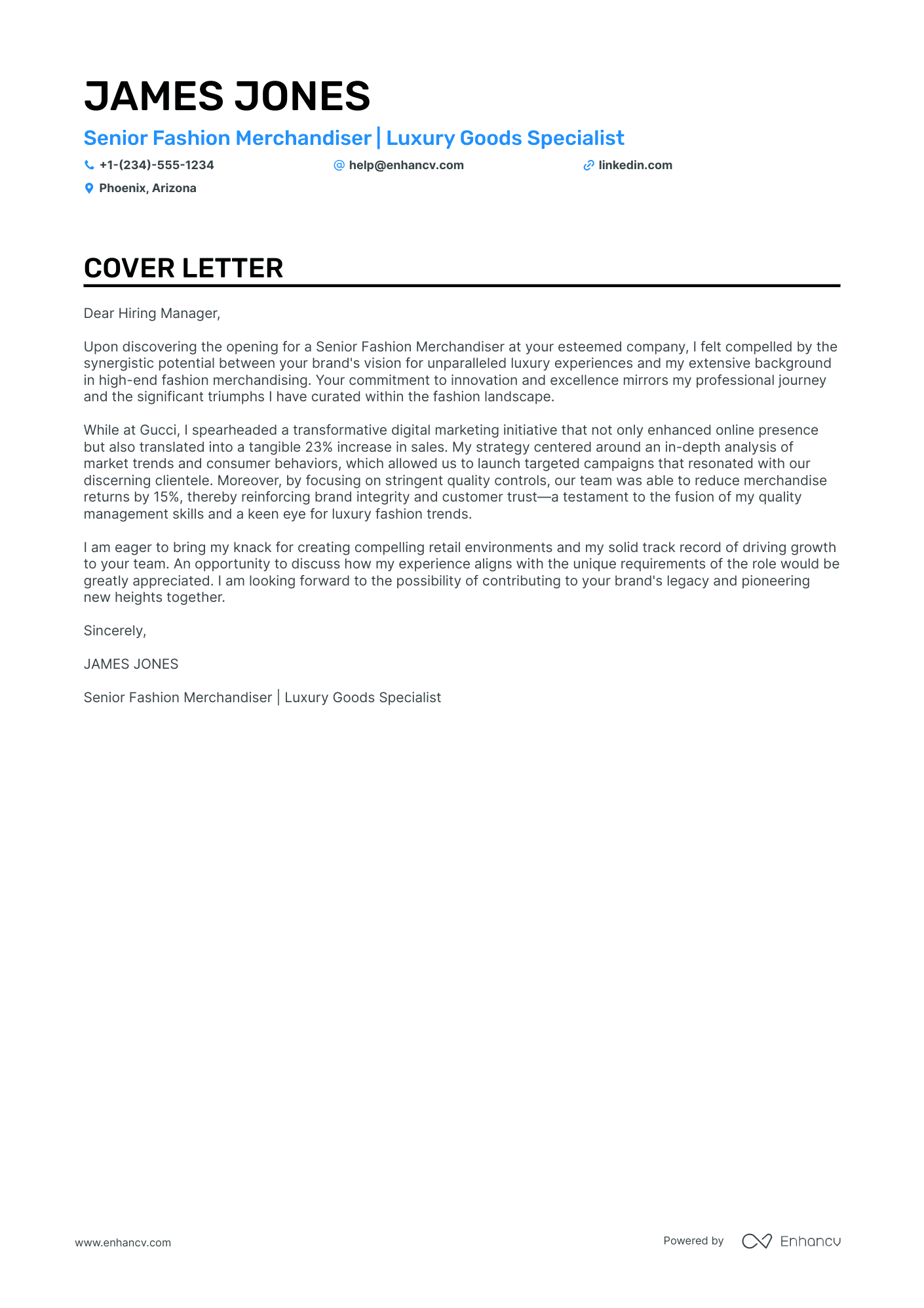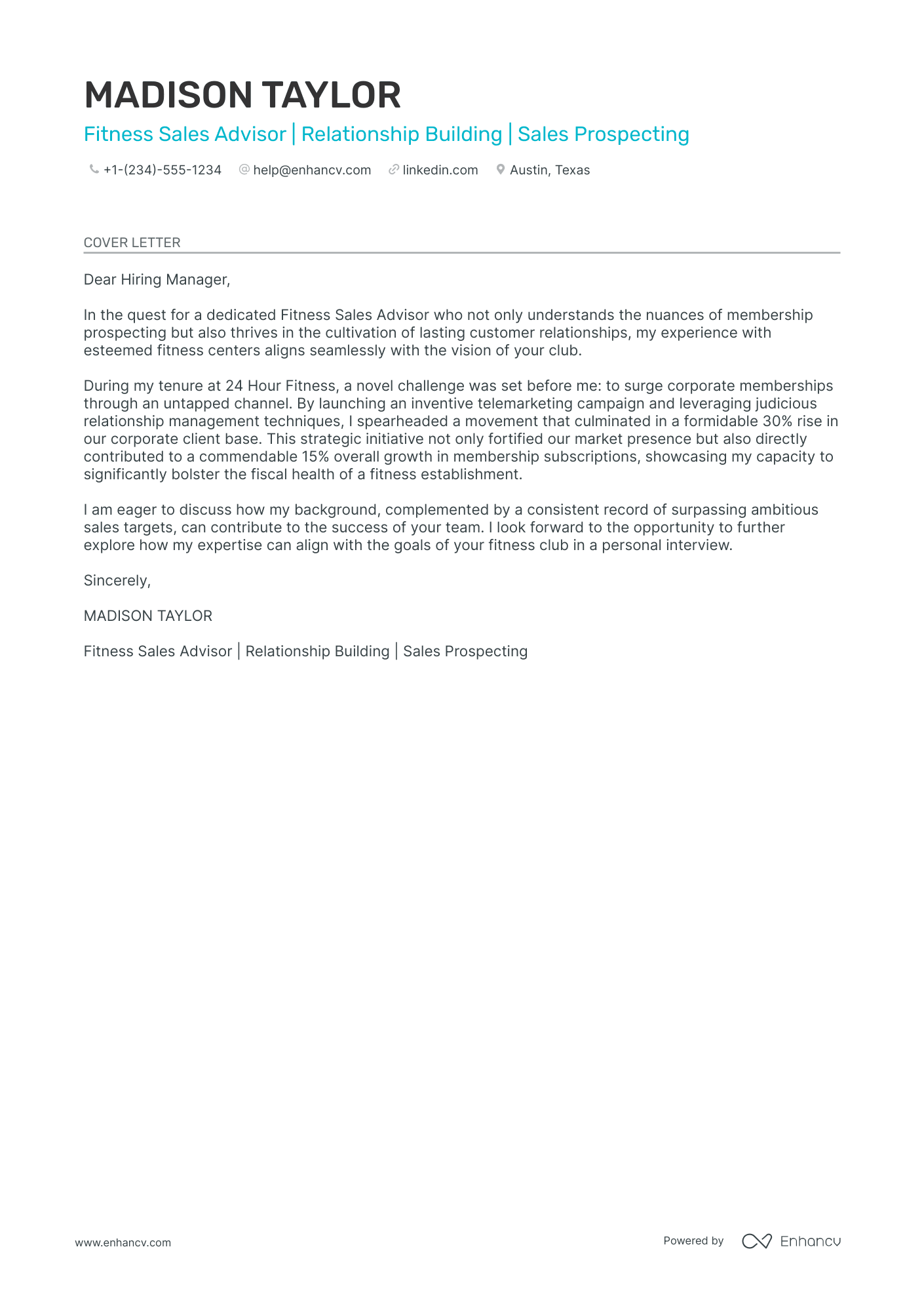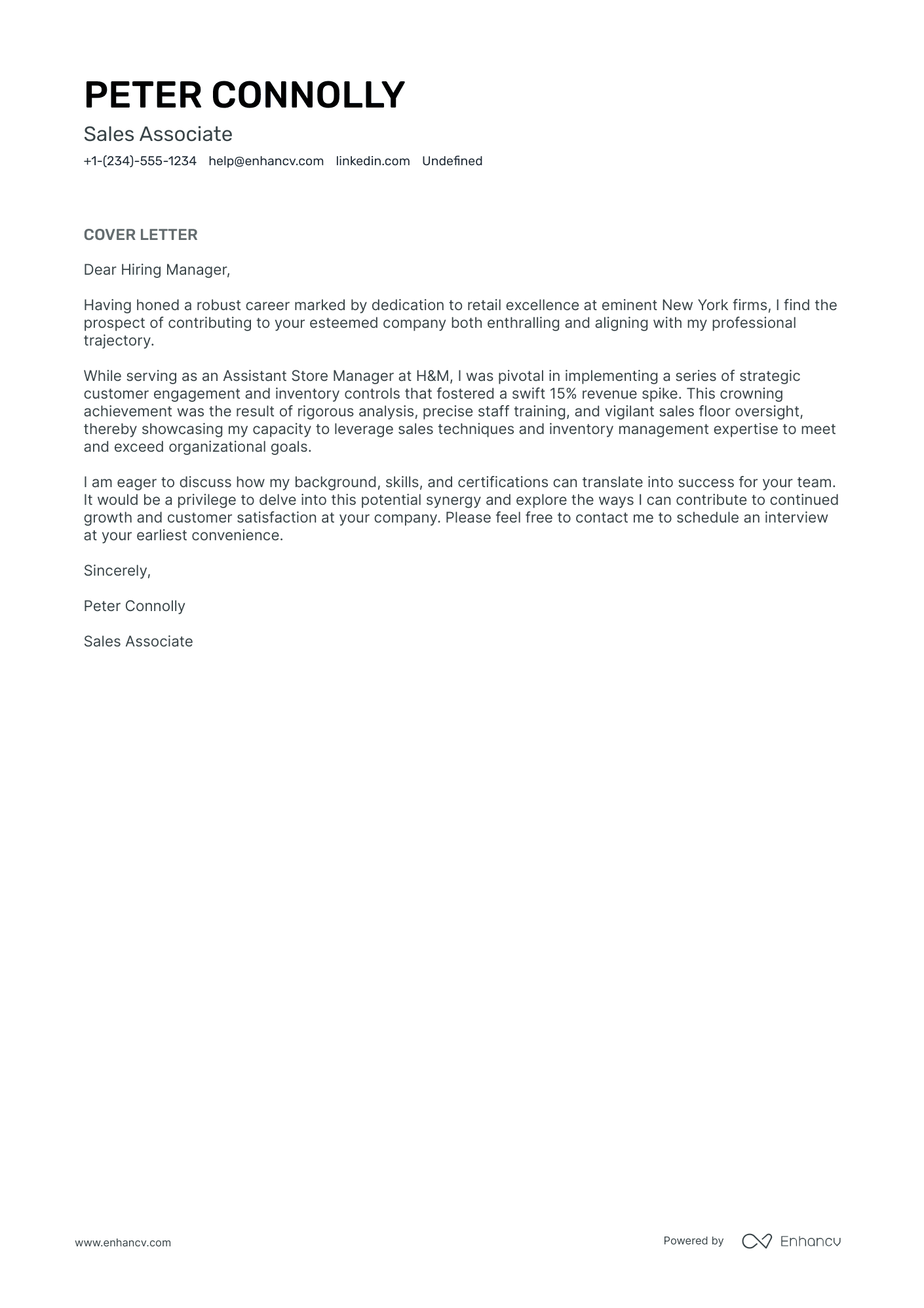Crafting a sales associate cover letter can be a daunting task, especially if you've just plunged into the job-hunting pool. You might have your resume polished, yet realize that a compelling cover letter is a key piece to the puzzle - one that shouldn't echo your resume but instead highlight a shining moment that you're truly proud of. Striking the right balance between formality and personality without veering into clichés is crucial. And remember, brevity is your ally; keep it to one page to make a strong, succinct impact.
- Personalize your sales associate cover letter and get inspired by other professionals to tell a compelling story;
- Format and design your sales associate cover letter to make an excellent first impression;
- Introduce your best achievement in your sales associate cover letter to recruiters;
- How to make sure recruiters get in touch with you, using your sales associate cover letter greeting and closing paragraphs.
What is more, did you know that Enhancv's AI can write your cover letter for you? Just upload your sales associate resume and get ready to forward your job application in a flash.
If the sales associate isn't exactly the one you're looking for we have a plethora of cover letter examples for jobs like this one:
- Sales Associate resume guide and example
- Enterprise Sales cover letter example
- Advertising Sales Executive cover letter example
- Junior Account Executive cover letter example
- CRM Project Manager cover letter example
- Sales Officer cover letter example
- Enterprise Account Manager cover letter example
- Pricing Manager cover letter example
- Head of Sales cover letter example
- Field Sales Representative cover letter example
- Waitress Cashier cover letter example
Drop your resume here or choose a file.
PDF & DOCX only. Max 2MB file size.
Sales associate cover letter example
CHARLOTTE MAY
Monaghan, Ireland
+1-(234)-555-1234
help@enhancv.com
- Quantifiable Achievements: The inclusion of specific, measurable accomplishments, such as increasing credit card sales by 40%, provides concrete evidence of the candidate's ability to deliver results in sales and marketing.
- Relevant Experience: Mentioning the role at Grimes, a leading dairy enterprise, suggests industry-related experience and an understanding of market dynamics, which is crucial for sales roles that demand industry-specific knowledge.
- Strategic Thinking: By highlighting the creation and launch of a successful marketing campaign, the candidate showcases strategic planning and marketing skills, which are pivotal in sales to drive business growth.
- Personal Enthusiasm and Alignment with Company Goals: Expressing eagerness to discuss fit with the company's goals hints at a personalized touch and the candidate's motivation to not just fill a role but add value aligned with the organization's vision.
What are the basics of the design or format of your sales associate cover letter?
To start, here's a reminder for you: the Applicant Tracker System (or software that is used to assess candidate profiles), won't be reading your sales associate cover letter.
Recruiters enjoy reading sales associate cover letters with a standardized format that uses:
- the same font as the resume (e.g. modern ones like Raleway or Volkhov are prefered over the clichéd Times New Roman or Arial);
- single spacing to keep the content concise and organized (this is all ready for you in our cover letter templates);
- a one-inch margin to wrap around the text, like in our cover letter builder;
- PDF as a file format, as it allows your design (and visual element) to stay the same.
Finally, we can't go on without mentioning the key sections of your sales associate cover letter.
In the top one-third, make sure to include a header (with your contact information, name, role, and date), a salutation, and an introduction.
Next, follows the heart and soul of your sales associate cover letter or its body.
End your sales associate cover letter with a closing paragraph and, if you wish, a signature.
Skip the hassle of writing a cover letter. Use our free cover letter generator and get it done in moments.
The top sections on a sales associate cover letter
- Header: This includes your contact information and date, ensuring the recruiter knows how to reach you for an interview or further discussion regarding the sales associate position.
- Greeting: A personalized salutation where possible demonstrates attention to detail and initiates a connection with the hiring manager, which is vital for sales roles that require interpersonal skills.
- Introduction: This section should grab the recruiter's attention with a concise pitch highlighting your enthusiasm for the sales role and any key achievements that align with the job's requirements.
- Body: The main content showcases your relevant sales experience, ability to meet targets, customer service skills, and any related training, which are key competencies for a successful sales associate.
- Closing: Here, you reiterate your interest in the position and call to action, such as inviting the recruiter to review your enclosed resume or arrange a meeting, showcasing your sales closing skills in a professional context.
Key qualities recruiters search for in a candidate’s cover letter
- Strong communication skills: Essential for interacting effectively with customers and colleagues to drive sales and provide exceptional service.
- Proven sales track record: Indicates the candidate's ability to meet and exceed sales targets, demonstrating their effectiveness in a sales role.
- Customer service experience: Shows that the candidate can handle customer inquiries and complaints gracefully, ensuring customer satisfaction.
- Product knowledge: Critical for providing accurate information to customers and for upselling products effectively.
- Flexibility and adaptability: Sales associates often need to handle multiple tasks and adjust to varying schedules or demands.
- Persuasive skills: Important for convincing customers to make a purchase and for building relationships that lead to repeat business.
What greeting should you use in your sales associate cover letter salutation
A simple "Hello" or "Hey" just won't work.
With your sales associate cover letter salutation, you set the tone of the whole communication.
You should thus address the hiring managers by using their first (or last name) in your greeting.
But how do you find out who's recruiting for the role?
The easiest way is to look up the role on LinkedIn or the corporate website.
Alternatively, you could also contact the organization via social media or email, for more information.
Unable to still obtain the recruiter's name?
Don't go down the "To whom it may concern path". Instead, start your cover letter with a "Dear HR team".
List of salutations you can use
- Dear Hiring Manager,
- Dear [Company Name] Recruitment Team,
- Dear [Department Head's Name],
- Dear [Mr./Ms./Dr. Last Name],
- Dear [Job Title] Search Committee,
- Dear [Mr./Ms./Dr. Last Name] and Team,
Using your sales associate cover letter intro to show your dedication
We know just how difficult it is to start writing your sales associate cover letter introduction.
There are so many great qualities you have as a professional, which one should you choose?
How about writing up to two sentences about your passion and commitment to the work you do or are set to do?
Try to describe exactly what you enjoy about the potential role.
A positive attitude from the get-go will help you stand out as a motivated sales associate professional.
The middle or body of your sales associate cover letter body: a great instrument to tell a story
Now that you've set the right tone with the greeting and introduction of your sales associate cover letter, it's time to get down to business.
Hear us out, the body of your sales associate cover letter is the best storytelling instrument you have, in your job-hunting arsenal.
Writing the next three to six paragraphs, take the time to reassess the advert to discover job-crucial requirements.
Next, choose one accomplishment that covers those key skills and talents.
Use precisely that achievement to tell an exciting story of how you match the ideal candidate profile.
In the undertones of your story or sales associate cover letter body, hint at the difference you'd make and sell your application as the perfect one for the job.
Final words: writing your sales associate cover letter closing paragraph
The final paragraph of your sales associate cover letter allows you that one final chance to make a great first impression.
Instead of going straight to the "sincerely yours" ending, you can back up your skills with a promise of:
- how you see yourself growing into the role;
- the unique skills you'd bring to the organization.
Whatever you choose, always be specific (and remember to uphold your promise, once you land the role).
If this option doesn't seem that appealing to you, close off your sales associate cover letter with a follow-up request.
You could even provide your availability for interviews so that the recruiters would be able to easily arrange your first meeting.
The zero experience sales associate cover letter: shifting the focus to your unique value
Don't worry if you have no conventional professional experience. Within your whole experience, there's plenty more you can write about in your sales associate cover letter.
Take, for example, your biggest achievement or award - dedicate your cover letter body to describe it and the job-relevant skills you've learned.
Your professional ambitions could also take center stage. Describe what you plan on achieving in the next five to ten years and the efforts you're making towards your dreams.
Key takeaways
Your sales associate cover letter is your best shot at standing out by showing your motivation and the unique skills you'd bring to the job:
- Chose no more than one achievement, which you'd be talking about in the body of your sales associate cover letter, by focusing on skills and outcomes;
- Address recruiters with their first or last name, or "Dear Hiring Manager" in your sales associate cover letter greeting;
- Introduce in no more than two sentences what makes your profile unique (perhaps it's your motivation, enthusiasm, or appreciation of the company you're applying for);
- Select the same font you have used in your resume (avoid Times New Roman and Arial, as most candidates tend to invest in them);
- Close your sales associate cover letter with a promise of how you see yourself growing in the company and the benefits you'd bring about.
Sales Associate cover letter examples
By Experience
Senior Sales Associate
By Role







